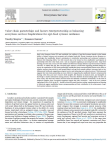Manyise T., Dentoni D. (2021). Value chain partnerships and farmer entrepreneurship as balancing ecosystem services: implications for agri-food systems resilience. Ecosystem Services, 01/06/2021, vol. 49, p. 1-9.
https://doi.org/10.1016/j.ecoser.2021.101279
https://doi.org/10.1016/j.ecoser.2021.101279
| Titre : | Value chain partnerships and farmer entrepreneurship as balancing ecosystem services: implications for agri-food systems resilience (2021) |
| Auteurs : | T. Manyise ; D. Dentoni |
| Type de document : | Article |
| Dans : | Ecosystem Services (vol. 49, June 2021) |
| Article en page(s) : | p. 1-9 |
| Langues : | Anglais |
| Catégories : |
Catégories principales 06 - AGRICULTURE. FORÊTS. PÊCHES ; 6.5 - Gestion des ExploitationsThésaurus IAMM SYSTEME AGROALIMENTAIRE ; SYSTEME DE PRODUCTION ; SERVICE ECOSYSTEMIQUE ; PETITE EXPLOITATION AGRICOLE ; COMPORTEMENT DES AGRICULTEURS ; CHAINE DE VALEUR ; RESILIENCE ; PARTICIPATION ; PARTENARIAT ; ENTREPREUNARIAT ; PAC ; UNION EUROPEENNE |
| Résumé : | Both in the European Union (EU) and worldwide, the resilience of agri-food systems depends on the human ability to balance between socio-economic and ecological trade-offs. Recent ecosystem services literature acknowledges that smallholder farmers’ participation to stakeholder partnerships and continuous learning influences their balancing ability. Yet, little research has so far focused on how smallholders’ participation in partnerships with other value chain actors - such as companies supplying or procuring from them - shape their learning processes and, in turn, how their mindset and behavioral change influences agri-food systems resilience outcomes. To address this gap, this conceptual paper advances a framework suggesting plausible linkages between: the organization of value chain partnerships; smallholder farmer entrepreneurship (meant as the ability to redeploy resources innovatively in and around farms); and agri-food systems resilience outcomes (such as stabilizing rural livelihoods, supporting ecological services and enhancing socio-cultural services). This framework suggests that value chain partnerships are more effective in supporting the smallholder farmers’ entrepreneurial learning: when they pool more resources (both tangible, like financial or physical assets, and intangible as knowledge or market information) among partners; when they distribute decision-making rights over their use more evenly; and when they balance between formal and informal coordination mechanisms. On the basis of empirical examples, these conceptual arguments suggest that policy incentives – such as the new Common Agricultural Policy (CAP) in the EU – should be directed towards resource pooling, experimentation and learning to effectively support smallholder farmer entrepreneurship and their contribution to the achievement of agri-food systems resilience outcomes. |
| Cote : | En ligne |
| URL / DOI : | https://doi.org/10.1016/j.ecoser.2021.101279 |







